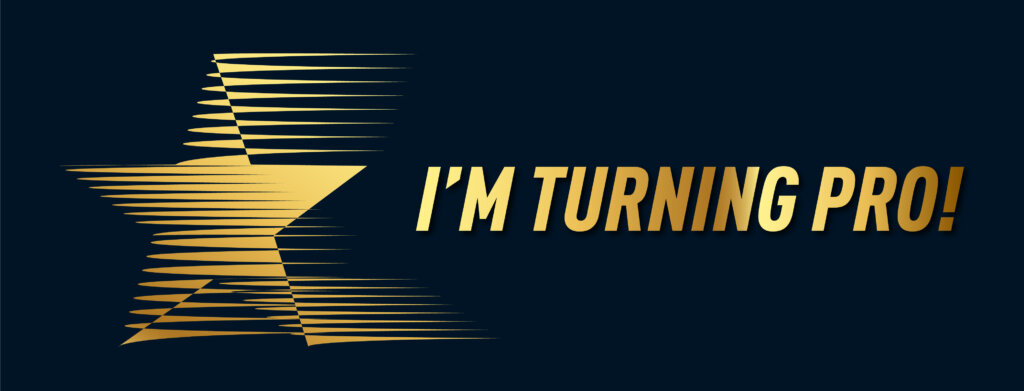Executive Podcast #269: I’m Turning Pro!

In this episode, Chris and Perry discuss the concept of “turning pro” as a leader. Perry recounts a personal experience at a corporate event where despite the lackluster audience response, the band, Earth, Wind, and Fire, displayed a high level of energy and professionalism. Perry and Chris reflect on the lessons that can be learned from this experience, such as leading oneself first, being teachable, and empowering others.
References:
Become a Maxwell Leadership Certified Team Member!
Download our Learning Guide for this podcast!
Perry Holley:
Welcome to the Maxwell Leadership Executive Podcast, where our goal is to help you increase your reputation as a leader, increase your ability to influence others, and increase your ability to fully engage your team to deliver remarkable results. Hi, I’m Perry Holley, a Maxwell leadership facilitator and coach.
Chris Goede:
And I’m Chris Goede, executive vice president with Maxwell Leadership. Welcome and thank you for joining. If you as an organization are looking for a team to help you with culture, maybe develop some of your leaders, maybe even coach some of your leaders, man, we would love to help you. That’s what Perry, myself, our entire team does. And we wake up and think about that every day. It’s where the content from a lot of this podcast comes. Just we love what we get to do and help people with that. If you’re interested in that, I want to encourage you to go to Maxwellleadership.com/podcast, click on this podcast, and then at the bottom you’ll see a form and you can fill that out.
Chris Goede:
You also can leave us a comment or a question that you might have for Perry and I. Well, today’s topic is called I’m turning know if you’ve listened to us. Perry. And I love athletics. So immediately I thought, man, I can’t wait to get into this one. And so I’m preparing and I’m looking through the notes, and I’m like, what are we talking about, Perry? So take us away. And I may not say another word the entire podcast, but this one’s on Perry.
Perry Holley:
Well, I attended a corporate event for one of our clients, invited us to be there. And as part of the evening reception, they surprised everyone and said, get on the bus. They took us to a local auditorium, and we walked in and the head guy got up and said, ladies and gentlemen, please welcome rock band Earth, Wind and Fire. And the curtain goes up and out walks Earth, Wind and Fire. Now, these are from the 70s.
Chris Goede:
Wasn’t a cover band. No, it was Earth, Wind and Fire.
Perry Holley:
Actually had three of the original members are there. And I knew them. I know the words, some of the songs I know. That what really captured my attention. Why this makes it here is that I was standing near the back. Sitting near the back and the light, the bright lights coming from the stage and all I could see the entire audience, mostly there’s about 100, 125 of us, mostly middle aged business people and 100% sitting down and Earthwind and fire on the edge of the stage. Explosions going off and band playing and the dancing going on and they’re doing the come on, everybody clap and nobody’s clapping and nobody’s on their feet. Nobody’s cheering them on.
Perry Holley:
And it just occurred to me, and I looked it up real quick, I said, this is three of the original members. And I knew them in the 70s. How old? 72 years old. These guys are up there. And it just occurred to me the energy that they were bringing had nothing to do with us, the audience. They weren’t dependent on us to feed their energy. They were professionals. And I thought they were at the height of the they were on stages all over the world and now they’re a corporate entertainment for an hour and 15 minutes to a bunch of men and women who are just sitting there going and I thought, oh, my gosh.
Perry Holley:
Do we allow as a leader, do you allow the energy of the team or the attitude of the team or of the attitude of the customer? Do you allow that to control you or do you bring your full energy and your full attention and your full professional self to what you’re doing? And it just got me thinking about what do professional leaders do that amateur leaders don’t do? And it all based on Earth, Wind and Fire bringing it. I mean, they brought it for over an hour at 72 years. And we gave them nothing. We encouraged them. Nada and they didn’t back down. They were complete pros at how they did it.
Chris Goede:
I got a bunch of thoughts, but I’m going to keep some of them to myself. But the first thing is I do want to share is I think we just lost all of our listeners by this title. Secondly, I want you guys to know that Perry was texting me and he’s like, I now know what I want to do when I retire. This is amazing. I missed the boat. I need to be able to do this. And so we were able to experience this thanks to Brian Porta. A little shout out for that experience.
Chris Goede:
But it is fascinating to watch something like that and then go, okay, as a leader, to your point, how do I handle that? The first thing I thought of was, man, they never cared about what the people in the stands were doing. How many times as a leader do we get up and communicate and all of a sudden because we start to doubt what we’re communicating and question is this landing you’re in front of rooms all the time, it, are they picking up what I’m putting down? Are they laughing? You and I like to have fun and make people laugh. They’re not laughing. Oh, my gosh. Now all of a sudden, the self talk starts.
Perry Holley:
Yes.
Chris Goede:
And we get to the point where we go and that amateur where we’re going to get into this this amateur point kicks in and we go, oh, we’re not good. It’s not connecting. I’m not doing a job. And you have all this it sounds like they never once thought about that. And so you want to, as a leader, be contagious. You don’t want to come across as inauthentic. But what I love about what you’re sharing is man, what they were sharing was personal and passionate to them. And if you’re not leading and you’re not involved in an area that’s personal passionate to you, then maybe you need to make a change.
Chris Goede:
They were 70 what did you say? 72 years old.
Perry Holley:
72 years old.
Chris Goede:
Getting after it and loving it. And because that’s what they love to do. And I think if you ask them, deep downside, yes, they’re pros and they’re entertainers, but deep downside, they’re probably like, man, I don’t care if Perry’s sitting in the back on his phone texting Chris or not clapping. This is what we love to do. We’re going to get after it today. So I think as leaders, just a couple of thoughts in response to that. In regards to the energy level, I think you do want to bring energy, and it’s contagious. You got to manage them.
Chris Goede:
That self talk when it’s not happening, but it’s got to be personal and passionate about what you’re doing.
Perry Holley:
Well, I just put a couple of things together to think as looking at myself as a pro. Are you a pro at what you do?
Chris Goede:
Right?
Perry Holley:
Are you a professional at leading or do you do amateur things? So I thought maybe we could just share a few. Why don’t you go start us off? I don’t know how many there are.
Chris Goede:
But there’s several on here. Yeah, I’ll jump in. The first one we have is here. Professional leaders lead themselves first. This is a common principle that you hear from us often. They do things that they tell others they should be doing. So in your example, right? Like, they were asking you to bring the energy. Well, they were bringing the energy, right? We ask people as leaders to continue to grow and invest in themselves.
Chris Goede:
Are we doing that? Are we leading ourselves that way? Amateur leaders, they don’t have the time to invest themselves. They make excuses. They don’t prioritize the personal development.
Perry Holley:
I think this is huge, and people are watching you all the time. They’re trying to decide, are you modeling what you want others to do? I think the self awareness part of understanding your own strengths and weaknesses and how you lead you is incredibly important. A second one I thought as I picked up watching these pros work, was thinking about as a leader, being professional means I’m teachable. We talked about this a lot over the last couple of weeks on the podcast. I think it’s come up a number of times. But they’re teachable meaning. They ask more than they tell. Amateur leaders love to boss people.
Perry Holley:
They love to tell, tell, tell. I love seeing a professional leader who then says, I’m curious. I’m teachable. They ask more than they tell. They look for the things they don’t know. They make themselves open to growth, into learning. They value what others are bringing to them. I think that you can really tell a difference.
Perry Holley:
An amateur just rests on their title and does more bossing.
Maxwell Leadership Certified Team:
Hey, podcast listeners. Many of you listening right now would probably love the autonomy that comes with owning your own business or becoming a coach that helps other businesses succeed. Well, we have a phenomenal strategy where you are 100% in control of your own business, earning income on your own terms, and have access to the people, tools and resources you need to build a thriving leadership development business. When you become a Maxwell Leadership Certified Team Member, you join a global community of entrepreneurs led by our expert team of mentors and faculty, including John C. Maxwell. You’ll also get one of the top leadership certifications in the world next to your name, giving you the boost you need to get started. Visit us online at MaxwellLeadership.com/JoinTheTeam to find out more.
Chris Goede:
Number three professional leaders have a coaching mindset. You see an opportunity, you identify the opportunity in individuals where maybe they’re missing the mark, and you take that opportunity to give feedback and help others. That’s that level four influence that we talk about, how we want to continue to pour and develop in other people. So you have that coaching mindset. You just don’t allow things to just to go by. Right. Whereas amateur leaders would then judge others because of those shortcomings and would definitely not risk trying to coach them, but maybe even shame them at some level. And this is no doubt an influence killer.
Perry Holley:
This was a personal learning for me that I snuck in here, that I have a high standard and I expect people to do certain things and then I try to model that myself. But when they come up short and people come up short, I come up short. You don’t succeed all the time. But when they didn’t succeed and by the way, this was at home as much as at work was, I would judge and I would condemn and I would talk down. And that’s amateurish. I thought, what I really want to do is I framed it as the coaching moment. So now when I see someone not making the bar, not succeeding, or not doing what I think they should do, hitting the standard that I like to see, the professional in me says, that’s the coaching moment, and that’s great. I don’t judge.
Perry Holley:
It’s my own little phrase to say, remind yourself, Perry, this is the coaching moment. Don’t shame them as you said, or ridicule them or judge them in front of don’t comment negatively. Coach them. This is the coaching moment. So I love leaning into that one a bit. Number four. I just felt like as a professional leader, I empower others. John talks about the law of empowerment that secure leaders, give power to others, where I think amateur leaders get a lot of personal satisfaction over micromanaging others and staying a little close and not thinking you have what it takes and making sure I do have what it takes.
Perry Holley:
So I’ll hang over your shoulder versus empowering you. I wonder if you have a thought about this is one of those words we throw around. Yeah, I want to empower people, but I say, how do you do that? I don’t know. People know so much about how to empower, but they like the way it sounds. What’s your thought?
Chris Goede:
They do. And what I think they do is I think they delegate more than they empower. Right? Amateur leaders will just delegate because they say, oh, hey, look, I delegated it to my team. But there’s a big difference between just delegating something and then empowering. And if you really want to do a little bit of a leadership study, dig into that word because Perry mentioned it’s a deep word, and it will set you up for success when it comes to being able to develop people and increase that level for influence. There’s a big difference there. And I think professionals empower, where maybe amateurs would just say, hey, I delegate. Number five professional leaders demonstrate vulnerability.
Chris Goede:
And we’ve talked about this. You just have to be transparent. They already know what you’re not good at, where you make mistakes. Whereas amateur leaders love this. Man, I got this thing all together. I got all the answers. They appear perfect. Well, as soon as that happens, you can right away tell that they are amateurs and not professionals.
Perry Holley:
Yeah. People vulnerability drives trust. And that ability to make people know that you are teachable you’re growing, you don’t have all the answers is a signal to others that one, you’re a pro, and two, you’re real. And people would much rather be around a real leader than someone who’s like Craig Greshell, he said that when a leader who doesn’t have to be right all the time, he’s real like that. Do that. Number six, I think professionals set a high standard for performance. They do not accept mediocrity. Amateur leaders allow followers to set their own standards, whatever that may be.
Perry Holley:
They’re not out in front. They don’t set what they expect from others. They don’t have to set those expectations out. And most people don’t know what the standard of performance is. They just come to work, go home. So a professional leader, I think, puts a target in front of people and says, this is how we do things here, and then you don’t accept substandard work. And that’s the coaching moment, perhaps, but then holding people to the higher standard.
Chris Goede:
Number seven professional leaders lead by example. I love that you put this in here. Obviously, they were leading by example. Back to your incredible concert. I don’t know if it was a speech, I don’t know what it was. You were sitting in the couch. But they were leading by example. They were bringing the energy to you were talking about and they were being pros even at the age of 72.
Chris Goede:
One of the things that’s a pet peeve for me as a leader is when you don’t know or you haven’t experienced something and you ask somebody to do something, you go, well, that shouldn’t take very long. Why don’t you go ahead and do that? And I immediately think, well, number one, would you do that yourself? And then number two, don’t make assumptions. You know how easy that is if you haven’t done it, right. So as leaders, I think one of the greatest compliments you can get from your team is that let’s say you’re leading a sales team and you have to make 100 calls by the end of the day because something has come up great. If I’m leading that team, then give me 20 calls, right? I’ll pick up the phone and dial. And so being willing to jump in is, I think, a compliment that your team can give a leader that says, man, no matter what we have to do, obviously, that’s not the best use of our leaders time, but if we needed he or she to do that, they’re going to roll up their sleeves and get in there. And I think that’s a professional leader shows that, whereas amateurs might not. They may just tell you to do it.
Chris Goede:
They don’t even know how to do it. They don’t know how long it’s going to take, nor would they be willing to help you do it.
Perry Holley:
Well, I had this leading by example is that people are watching and they know if you’re asking them to do something that you don’t do is a sign of an amateur, for one. But somebody told me one time that some people on the team had come to them that Perisher has a high standard and he’s always expecting more from us, and we don’t ever seem to be getting it over the bar that he’s setting for us. And I thought maybe I should have feel bad about that. But then I just said, well, how did you handle that? And the other person said, Well, I asked him, is he asking you to do something he doesn’t do? Because what I’m seeing that he’s asking, he’s doing also. And I thought, well, yeah, I would I did at home. If I told the kids, you have to have your bed made every day before you leave for school, all they got to do is go look at my room and see is my bed made. If I say, pick up your clothes so your mother doesn’t have to, they go, look and see where my clothes are. And if I say, Police your space, they go, look at my space.
Perry Holley:
And so the same thing at work is our people are watching. Are you upholding the standards? Are you upholding the expectations, or are you an amateur? You say, yeah, I’ll tell them to do it. It’s good for them. It’s not good for me to do that. Finally, number eight, professional leaders, I think, build trust with their team where amateur leaders don’t realize how small indiscretions of not following through, not keeping commitments, not walking your talk, erode, trust over time. I think professional leaders realize that trust is the linchpin of leadership and you’re not going to do anything without trust. And people will pull back, disengage, not commit, not buy in if they lack trust with you. So you teach a lot about building trust with the team, and it’s got to be something that probably should have made that number one, not number eight.
Chris Goede:
Well, these are eight things that I think when you talk about, I’m turning pro as a leader that you need to be aware of. Two, takeaways as I wrap up for us today. Number one, remember how I mentioned early on, if you have any content or questions that would help drive our podcast, we need you to send them in. Perry’s pulling from Earth, wind and fire. I’m just kidding. So we need your help with content. No, what I love about this was as I was listening to us just have our conversation and go back and forth, not kind of we just gave a small case study on the five levels of leadership. Everything from an amateur standpoint that we referred to on the negative side of this would really be leading straight from level one, from your title and not from your title.
Chris Goede:
And it’s like command and control. We’re going to be a dictatorship. This is what we’re going to do. Versus as you work towards making your way up through the minor leagues and getting to the pros, no matter what your age is to get there, you’ve got to understand at levels two level, which is to be able to connect, let them give you permission. Level three, we got to produce together by the way it’s in and through the team. And then number four, we talked about coaching and developing, and so I’d encourage you to go back and to re listen to this lesson. And we like to have fun and goof around, but each one of these eight, you can really tie to the five levels of leadership and how it differentiates between leading as an amateur versus leading like a pro.
Perry Holley:
I encourage you also, this is a great lesson to teach, because I did this I led sales teams for years, and I would notice that there are things professional salespeople do that amateur salespeople don’t do. So anybody on your team from you leading to them, leading to them in their roles, just ask them, are they acting like a professional? And what are the things that professionals do that amateurs just won’t do well, and you’ll get some answers from that. And I stand by my concert experience. I thought it was amazing to watch these guys. They brought the goede.
Chris Goede:
You did. We’re having fun. But you were texting me, being like, this is unbelievable.
Perry Holley:
Unbelievable.
Chris Goede:
And we were so I almost lost you to them. I think you were going to be their stage manager. But I talked to you out of that.
Perry Holley:
But the audience, we were such slugs and they just wouldn’t let that bother them.
Chris Goede:
All.
Perry Holley:
Yeah, they wouldn’t budge. All right. If you want to know, get the Learner guide for this or learn more about our offerings. If you’d like to leave us a question or a comment, see the other in our family of podcasts. You can do all of that at maxwellleadership.com/podcast. We love hearing from you. Very grateful you join us today. That’s all today from the Maxwell Leadership executive podcast.
To be a Successful Leader, You Need Feedback on Your Leadership.
We’re excited to announce our new and improved Organizational Effectiveness Survey (OES). The OES gathers feedback from employees to give leaders and management the knowledge and action plans needed to develop a more effective and productive work environment. Our new version measures 4 areas of your business: Leadership, People, Strategy, and Performance.













2 thoughts on "Executive Podcast #269: I’m Turning Pro!"
Great episode.
An idea for a future episode :
What to do if your under a bad leader at work example: manager, any kind of boss that is above- do we stay do we go or do we have a choice?
Investing in human capital means equipping people with knowledge, good health, and skills so they can take on the jobs of today and create the jobs of the future.
When countries and communities invest in people, they create a strong workforce that’s able to grow and adapt to global shifts including technological transformation and climate change.
Wishing you a joy filled and adventures Christmas.
Augustine Cumbi.